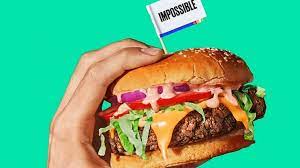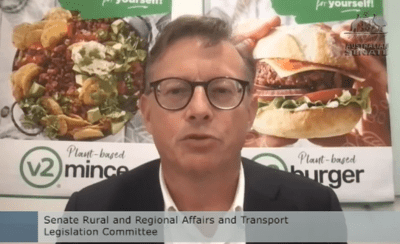2012 Beef Company Is Fake Meat Why
MANUFACTURERS of plant based "fake meats" have told a Senate Inquiry they fully support the need for clarity in labelling to prevent consumer confusion in the marketplace.
 But they have also defended the use of identifiers such as beef, pork and chicken on the labelling of their plant-based products, saying these are needed to ensure consumers understand their product.
But they have also defended the use of identifiers such as beef, pork and chicken on the labelling of their plant-based products, saying these are needed to ensure consumers understand their product.
One Australian based manufacture and exporter of plant-based meat substitutes told the inquiry his rapidly growing business will have to move off-shore if it is not allowed to use specific meat terms such as chicken.
Without those terms consumers would not understand what the plant-based products are going to cook, taste and eat like, plant-based manufacturer representatives told a public hearing of the Senate Rural and Regional Affairs Inquiry into definitions of meat and other products yesterday.
"We do not see a problem with that, we have chicken nuggets instead of white meat nuggets, because consumers understand the product is going to taste like a chicken nugget, not a beef nugget or a fish nugget," Tyler Jameson (below right), Vice President Government Relations with Impossible Foods told the inquiry via video link.
 "We have used pork instead of white plant-based meat or white meat made from plants because they know they're going to get the same fat level and chewiness of a minced pork as opposed to a minced turkey or a minced chicken."
"We have used pork instead of white plant-based meat or white meat made from plants because they know they're going to get the same fat level and chewiness of a minced pork as opposed to a minced turkey or a minced chicken."
"…it makes more sense from product utilisation and consumer optics and understanding to call it beef with the appropriate qualifiers and language on the label, that says contains no animal products, made from plants etc, so that consumers don't actually purchase it thinking it is from a cow".
But yet Champagne can only come from the Champagne region in France, and many cheese products can only use certain names if they are produced in a specific region.
Why, Senator Susan McDonald asked, do we have this big push on provenance on some products, and yet on plant-based products we're saying this is somehow different?
Mr Jameson responded by saying the issue of geographic indicators was one that many countries and states consider to be "protectionist".
Representatives of US manufacturers Impossible Foods and Beyond Meats and Australian companies v2food and Deliciou each stated they had no interest in confusing consumers because their entire value proposition was based on the fact their products which they call meat are made from plants.
Beyond Meats counsel Jessica O'Connell said the company's position is that using consistent standardised food terms that consumers understand along with qualifiers such as plant based is the very best way to convey to consumers what they're purchasing.
"For example, when a consumer sees our Beyond Mince plant-based mince product they know this meat is from plants because of that phrase 'plant-based'," she said.
"They know it is intended to function as any other mince, whether it is chicken, pork or plant-based and so we think this is really the most appropriate way to convey this type of information.
"We're confident the naming conventions are truthful, they're not misleading or deceptive, and they're sufficient to convey the true nature of plant-based meat products."
Stronger naming regulations would force move off-shore
Ketjil Hansen (below right), founder of Australian based company Deliciou which manufactures a range of vegan seasonings and pea, soy and wheat-based meat substitutes and exports to the US, Europe and Asia, said his company will be forced to move away from Australia f it cannot use meat terms to label its plant-based products.
 "If we are not allowed to use the word chicken together with the qualifying words plant based, then it would be impossible for the consumer to know that our plant-based product will taste and feel like chicken.
"If we are not allowed to use the word chicken together with the qualifying words plant based, then it would be impossible for the consumer to know that our plant-based product will taste and feel like chicken.
"If Deliciou is not allowed use meat and dairy names on our packaging, then it will be impossible for Deliciou to communicate the purpose of our products, to consumers and there will be no market for us in Australia.
"I will go as far as to say that if the outcome of this inquiry is that we are no longer to use meat and dairy terms, together with plant based qualifying terms, and it is no longer then it no longer makes sense for Deliciou to produce our products in Australia and we will be looking all of our production to overseas markets where meat terms are allowed to be used."
Impossible Foods grilled on mission to end livestock production
Impossible Foods was also grilled on its stated mission to end meat production from animals by 2035, comments which have earned the company considerable media coverage and publicity in a crowded and competitive plant-based market space.
Senator Susan McDonald pointed out that in Australia, livestock production is the largest agricultural industry, a major regional employer and one of the country's largest manufacturing industries.
"Your program would effectively seek to end the livelihoods of hundreds of thousands of Australian families who work in the livestock production supply chain – What would you say to that?"
Mr Jameson responded by saying he grew up on a farm.
"I understand why you ask that question, my snow days in school were spent not sleeping in, they were spent throwing hay out to the cows and horses.
"I understand that this is a personal cultural issue for farmers and our company does not go out of our way to denigrate them necessarily.
"We are just putting a product out on the market and letting consumers decide."
Challenged that his statement was not consistent with the company's mission statement to end the production of food from animal derived products, Mr Jameson said he felt the company was being consistent.
"We're not asking the Australian Senate for anything, don't ask any of our legislatures back in the US for help, we're just putting a product out on the market and letting consumers decide."
Each of the plant-protein manufacturers said they have received no credible reports of consumer confusion from the labelling of their products and said the Government should not be making decisions based on "anecdotal" reports.
 "Legislative intervention should not be based on some anecdotes like 'I went to the supermarket myself and I was confused'," v2Food founder Nick Hazell (right) said.
"Legislative intervention should not be based on some anecdotes like 'I went to the supermarket myself and I was confused'," v2Food founder Nick Hazell (right) said.
"Because these anecdotes diametrically oppose the evidence provided to this inquiry by lots of organisations like the ACCC, FSANZ and also our experience where we have been selling to millions of unconfused consumers."
The inquiry heard that most ingredients used to produce the plant-based meat substitutes that sell in Australia are sourced from overseas.
Nick Hazell said that when he started v2food, he assumed it would be using Australian ingredients to make the plant-based burgers and mince it produces.
However, he said it was a shock to find that protein extracts, concentrates and isolates which are the building blocks of alternative protein are not made in Australia.
"We do grow great legumes and pulses, we have an amazing agricultural sector, but no one has felt the need to invest in manufacturing in Australia up until now.
"So that is deeply concerning and want to do something about it."
He said he believes Australia can quadruple the amount of high protein soy it produces from current levels as the plant-protein sector grows.
"We're forming consortia and partnerships so that we can grow the soy in Australia and process it in Australia, and that involves hundreds of millions of dollars of investment."
'Re-importing' Australian grown wheat
Ketjil Hansen from Deliciou said he faced the bizarre situation in having to re-import Australian grown wheat at present.
"We find ourselves with our plant-based meat range we have to import the key ingredient from overseas," he said.
"We have learned that supplier overseas imports themselves Australian wheat, processes it overseas, for us to then import it back to Australia.
"It is a huge lost opportunity to build out a massive processing of plant-based materials industry here in Australia.
"The opportunity is now to really invest in this, it will benefit so many farmers in Australia will benefit."
'Inquiry not an attack on plant-based proteins'
Plant-based protein companies have characterised the senate inquiry as an attempt by the meat sector to stifle the growth of a competitive threat to their industry.
However, Senator McDonald reiterated yesterday that the inquiry is not an attack on alternative protein sources and is simply about labelling and terminology to ensure clarity for consumers.
"The purpose of this inquiry is not in any way to limit the growth of plant-based protein market, I agree that in a hungry world we are looking for additional food sources.
"What this is about is what terminology is appropriate to use on this new food stuff".
v2food approach to marketing earns praise
Senator McDonald also singled out v2food for praise as a leading example of how to market plant-based protein products.
"v2food, I have no problem with any of your marketing, you use terms that we all agree on – burger, mince, sausage, bologenese sauce.
"I mean none of these… you don't use pictures of animals on your marketing materials, you don't use the words for animals in your marketing materials, so I am not quite sure why you are feeling so under attack because the purpose of this inqury is to talk about definitons, the words that we use to desacribe products, it is not in any way to discourage you from making plant-based proteins."
Source: https://www.beefcentral.com/news/fake-meat-manufacturers-face-senate-inquiry/
0 Response to "2012 Beef Company Is Fake Meat Why"
Post a Comment